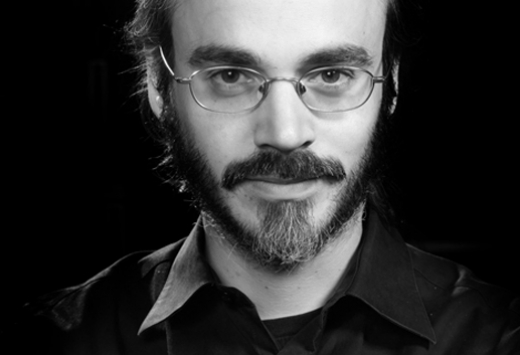@ City Halls & Old Fruitmarket, Glasgow, 1-3 May 2015
It’s the start of May and the cold outlines every punter’s breath as the rain screeds through the streets: Glasgow’s residents could be forgiven for wondering what compelled them to live in this ostensibly god-forsaken city. Luckily, this weekend, the vibrant arts scene offered reward-points for bravery, in the form of the BBC Scottish Symphony Orchestra’s Tectonics Festival. Co-curated by Ilan Volkov and Alasdair Campbell, and running in its third year, the festival hopes to show us “what contemporary music in the 21st century might sound like”. Whether or not that sounds like a tonic to counter the rain is debatable. Can it be hoped that this oasis of artistic invention will match the population’s bravery? Alice Elms catches a couple of concerts to find out…
Tectonics offers a multitude for its audience to take, leave, or sit some way in between. Will it be a full festival pass or a day pass, Goodiepal’s ‘classroom’ or the full symphony orchestra in the Grand Hall, sitting or standing, beer or sobriety? The choices are abundant. Under the microscope this year is the music of Éliane Radigue, a pioneer of electronic music who has, over the past decade, turned her hand to working in close collaboration with instrumentalists to create acoustic works. Tectonics, for me, starts here.
It’s a testament to the thoroughness of this event, and the heft of the organisers, that the four soloists assembled to perform works from Radigue’s OCCAM OCEAN series are the ones most steeped in her music and its processes today. Their control over their material is intense. Not only is there a technical mastery on display, but there is exhibited the kind of physical quiet that might be encountered on studying a well-practised life model at work. It comes as no surprise then that Radigue devoted three years to solely studying Tibetan Buddhism. Her music is evidently yoked with that practise, and happily, these musicians have the qualities to suggest they have gone to great lengths to imbue her ethos. It’s good to see musicians released from the usual dramatics of performance, and interesting to wonder how that translates into their usual ‘everyday’ practise. Perhaps it should be added to all young musicians’ armoury; scales, arpeggios, exercises – Radigue?
Describing her route into her work with synthesisers, Radigue speaks of finding a corner of sound that interests her, whose “skin” she then “dug under”. Sure enough, the parts of OCCAM OCEAN performed dig under and under again to plunder all the special textures and harmonic spectrums these instruments can emit. When cello and microtonal tuba converse they effortlessly distill sounds of the natural environment – seas, winds, and their play in rocky places. The result is beautiful, but also haunting, desolate, and somewhat lonely.
The combination of all four instrumentalists in the number that closes this concert is mesmerising; in part, this is because the preceding explorations have cleared the way for something special to dawn on the audio horizon, by honing the quality of each listeners’ listening. A new rhythmic interplay surfaces – most notably due to the bowed harp – and snatches of ‘tunes’ can be heard dancing through the detail. The ensuing delicate patterns are strangely like those of minimalist loops, though occurring through a different, more physical and more human chance mechanism. A gaping silence follows the works’ completion. The audience is not unappreciative: stunned, more like, enchanted and rapt.
Following the power of these stripped back forces, the culminating BBC SSO concert has a lot to live up to. First up: the world premiere of Peter Ablinger’s QUARTZ for high orchestra. Relentlessly strident glassy tick-tocks pound the ear in endless permutations of string effects – fast-bowed harmonics and excruciatingly high pizzicato – that are held in stiff time by electronic watch sounds. The orchestra (especially the variously divided string desks) appear a little on edge when dealing with these fearsomely difficult rhythms. No doubt the five world premieres of the previous day have taken their toll on their resources and energy.
Next is the first UK performance of Enno Poppe’s Altbau, a wild explosion of brass and percussive colour, with a crazed and restless rhythmic energy of which, once again, the orchestra doesn’t quite seem to ride the crest. The second movement is calmer, with eerie motifs buoyed by diaphanous harmonic landscapes laden with suspense.
To conclude we see the return of Rhodri Davies on harp (one of the Radigue soloists) to improvise alongside the orchestra, in a new work created by both him and composer Christopher Fox. The orchestra supports with a slowly shifting tableau over which Davies improvises. There is a lovely flexibility here, with varied control exerted by orchestra, conductor and soloist. To call it an improvisation ‘over’ doesn’t really state things accurately either. An improvisation ‘through’ works better: Davies expands the sounds already offered, attending to the colours with an array of gadgets and his two harps (little and large). How often do you see a conductor smiling with surprised delight at the additions magically whisked up by his soloist? The normal (staid?) orchestral set-up and processes are defamiliarised by the presence of Davies, who is a like a boy toying with his frankenstein. A much-needed bit of deviant fun and mischief.
The majority of the Tectonics 2015 concerts were recorded by BBC Radio 3, and will be available to listen to online from Sat 16 May on their contemporary music programme Hear and Now.
